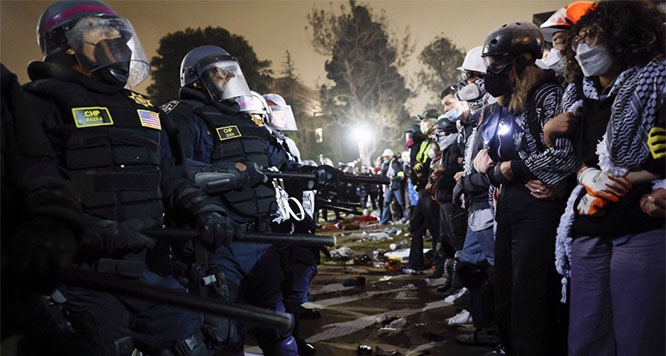Washington, May 20: President Donald Trump will use his first visit to the Middle East to call for unity in the fight against radicalism in the Muslim world, casting the challenge as a "battle between good and evil" and urging Arab leaders to "drive out the terrorists from your places of worship," according to a draft of the speech obtained by The news agency.

Abandoning some of the harsh anti-Muslim rhetoric of his presidential campaign, the draft of the speech, slated to be delivered in Saudi Arabia on Sunday, envisions new partnerships with America's traditional allies in the Middle East. It notably refrains from mentioning democracy and human rights — topics Arab leaders often view as US moralizing — in favor of the more limited goals of peace and stability.
"We are not here to lecture — to tell other peoples how to live, what to do or who to be. We are here instead to offer partnership in building a better future for us all," the document said.
Trump left Washington Friday afternoon for Riyadh, the first stop on his maiden trip overseas trip as president. The marathon trip will also take him to Israel, the Vatican, Belgium and Italy. The trip is a key test of the president's diplomatic skills and a chance to add substance to a foreign policy he has described broadly as "America First."
Two different sources provided the AP with copies of the draft of his remarks, billed as a marquee speech of the trip. One version, obtained late Thursday, included edits with comments from an administration official, indicating it was still a work in progress.
The White House confirmed the draft was authentic, but cautioned the president had not yet signed off on the final product.
"The president has not seen this draft," White House spokesman Sean Spicer said. "This is one of five drafts that have been written by various people. He continues to take input and is writing a final version."
Trump's campaign was marked by his anti-Islamic rhetoric and his administration has twice tried to impose a travel ban on several Muslim-majority countries. "I think Islam hates us," he said at one point.
The draft of the speech includes no mention of "radical Islamic terrorism" — a phrase that candidate Trump regularly criticized opponent Hillary Clinton and President Barack Obama for shying away from. His speech calls terrorism a widespread problem plaguing everyone who loves peace.
He positions himself as an "emissary for the American people, to deliver a message of friendship and hope," according to the draft.
"This is not a battle between different faiths, different sects or different civilizations. This is a battle between those who seek to obliterate human life and those who seek to protect it," the text reads. "This is a battle between good and evil."
Trump may seem an unlikely messenger to deliver an olive branch to the Muslim world.
Only a week after taking office, he signed an executive order to ban immigrants from seven countries — Iraq, Iran, Syria, Sudan, Libya, Somalia, and Yemen — from entering the United States, a decision that sparked widespread protests at the nation's airports and demonstrations outside the White House. That ban was blocked in federal court, prompting the administration to sign a second one.
The second version, which dropped Iraq from the list, is also blocked in court, though Trump has said the measure is needed for the nation's security. As a campaigner, he called for a "total and complete shutdown" of the entry of Muslims to the United States "until our country's representatives can figure out what the hell is going on," insisting that a sizable segment of the Muslim population has "great hatred toward Americans."
His Saudi speech is aimed at the nations represented at an Arab and Muslim leaders' summit.
Trump intends to condemn Syria's President Bashar Assad for committing "unspeakable crimes against humanity" and Iran for contributing to spiraling violence in Syria.
"All nations of conscience in the Middle East must work together to roll back Iran's destabilizing influence, restore a more stable balance of power in the region, and pray for the day when the Iranian people have the just and responsible government they deserve," the draft reads.
Iran and Syria were not invited to the summit, and they are not part of a regional military alliance that Saudi Arabia is establishing to fight terrorism. The kingdom backs efforts to topple the Syrian government, which counts Iran and Russia as its closest allies.
White House officials have said they consider Trump's visit, and his keynote address, a counterweight to President Obama's debut speech to the Muslim world in 2009 in Cairo.
Obama called for understanding and acknowledged some of America's missteps in the region. That speech was denounced by many Republicans and criticized by a number of the United States' Middle East allies, including Israel, as being a sort of apology. Obama aides have continued to defend it.
Administration officials believe Trump's decision to begin his trip in Saudi Arabia sends a powerful message to the kingdom: the strained ties that marked US-Saudi relations under Obama are over.
Unlike the Obama administration, which distanced itself from authoritarian leaders and took a moral stance against the human rights violations that in many cases fueled resentment and extremism, Trump is focusing on deal-making. Only in the case of Iran does his speech advocate for the "longest-suffering" people who are subject "to their leaders' reckless attempts to dominate their neighbors."
By contrast, Trump hails America's friendship with Saudi Arabia, which "stretches back many decades, and covers numerous dimensions." It is a markedly different message from his campaign tweet that said "Saudi Arabia and many of the countries that gave vast amounts of money to the Clinton Foundation want women as slaves and to kill gays."






Comments
Add new comment